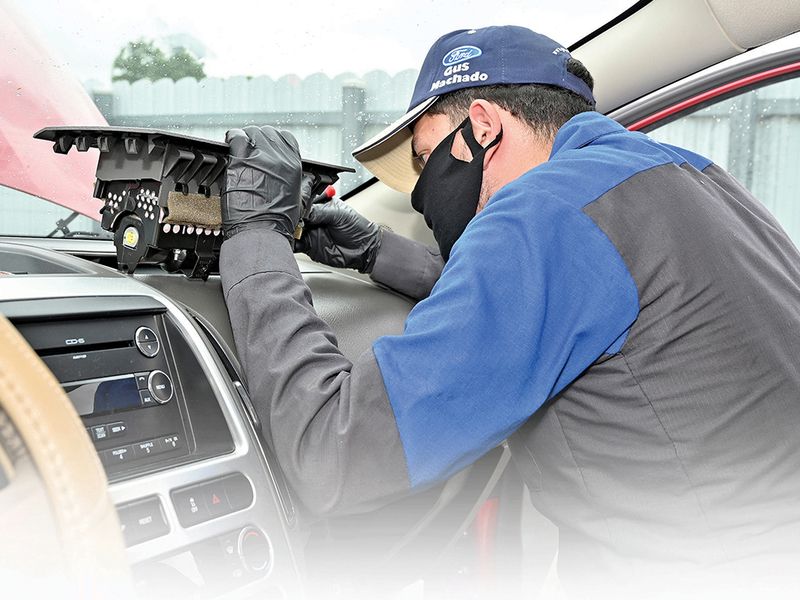
The new High-Roof Transit van that arrived at Gus Machado Ford Hialeah, near Miami, in early March was supposed to deliver service to the dealership’s fleet customers.
Then the COVID-19 pandemic hit. Big contracts, such as one with Miami-Dade County, went dormant. Parts and service director Amable Valle turned his attention to taking repairs to individual customers’ driveways.
The dealership sent emails to customers, posted videos on its website and publicized its mobile service van on social media. General Manager Victor Benitez appeared on Spanish-language TV to tout the vehicle disinfection that comes with mobile repairs.
And while it’s been a challenge luring some customers, especially older people wary of allowing visitors onto their property, Valle is convinced he’s found a way for his service department to broaden its reach.
“We already do pickup and delivery, too,” he says. “It’s just another thing we can provide to the consumer.”
Fixed ops consultant Jim Roche estimates there are roughly 300 repair jobs that techs can perform in a customer’s driveway instead of taking the vehicle back to the store. In addition to oil changes, they include airbag module replacements, computer reflashes and installation of maintenance items such as filters, wiper blade and lights.
Meanwhile, mobile repair specialist yourmechanic.com — a competitor to the franchised dealership service model — promises “over 500 car repair services at your home or office” on its website.
The Gus Machado Ford van is equipped with an Integrated Diagnostic System, a complete set of tools ($20,000 worth donated by Ford), a lube skid, compressor, parts shelves, a work desk, a dedicated Wi-Fi system and an electric power generator to operate the equipment. It is able to perform routine maintenance and light repair services.
The van cost the dealership $100,000. Gus Machado Ford pays a $499 monthly fee to the automaker for services such as training, website instruction and software updates. It staffs the van with one B-grade tech, paid hourly, and occasionally a trainee.
Customers aren’t charged for the mobile service, but Valle says that could change with demand. And once fleet customers return, Valle says the dealership intends to serve them along with individual customers.
“This is an ongoing investment for the dealership,” he says.
Ford was one of the innovators in the mobile service field, first piloting a fleet of vans in the U.K. as early as 2017. It then started a trial program with six dealers in the U.S. and slowly opened the market to the 200 dealerships offering the service today.
“We are seeing a significant lift in customer satisfaction scores from people who have utilized this service,” says Nick Thomson, customer experience activation manager at Ford. “We truly believe this is the future of customer service.”
Mercedes-Benz, which also has offered mobile service since 2017, has seen a spike in customer demand since the coronavirus pandemic began.
Its mobile van techs can replace tires and perform complete brake jobs on some vehicles at a customer’s home or business, says Christian Treiber, Mercedes-Benz vice president of customer service.
“The tricky part — to a degree — is to schedule the route of the technician for their service calls in the most efficient way. We have software for this now and that helps us schedule more effectively,” Treiber says.
Volvo also has been testing whether mobile service makes sense for its customers.
“In the short term, we think there are a number of jobs that can be done in the driveway and with a low investment for the retailer,” says Scott Doering, Volvo Cars vice president of customer service. “I think there is an opportunity for it for all the reasons there’s an opportunity for [pickup and delivery]. We just have to figure out the financial equation to make it work for dealers.”
Though some Volvo dealers are offering mobile service now, Doering expects it to be available at every Volvo dealer once the company pivots to electric vehicles. “We have a proposal that we intend to share with our advisory board. We’re thinking about it in the context of our electrified future and for very specific repairs,” he says.
BMW has a program in place with its dealerships in which an X3 SUV equipped with work tools is dispatched for minor services such as battery replacement, airbag recalls and even trim repairs. Kevin Aniunas, service manager for BMW of Fort Lauderdale in Florida, says some customers “just prefer not to have to come to the dealer for service.”
One reason is that they don’t feel the pressure of having to buy extra services, he says. And they can watch the technician work at their home.
“There’s a lot of transparency this way,” Aniunas says. “People are very friendly in their driveways. They will offer technicians water and other things when they see them sweating while they work.”
Even after the pandemic subsides, such efforts by automakers and dealerships appear likely to stick around. If managed well, they could serve as a valuable step toward a mutual goal: loyal consumers.
“We need to meet the customers where they want to be met, and frankly, that’s at the office or their home,” Ford’s Thomson says. “We want to give the power of choice back to the customer.”
Richard Truett contributed to this report.